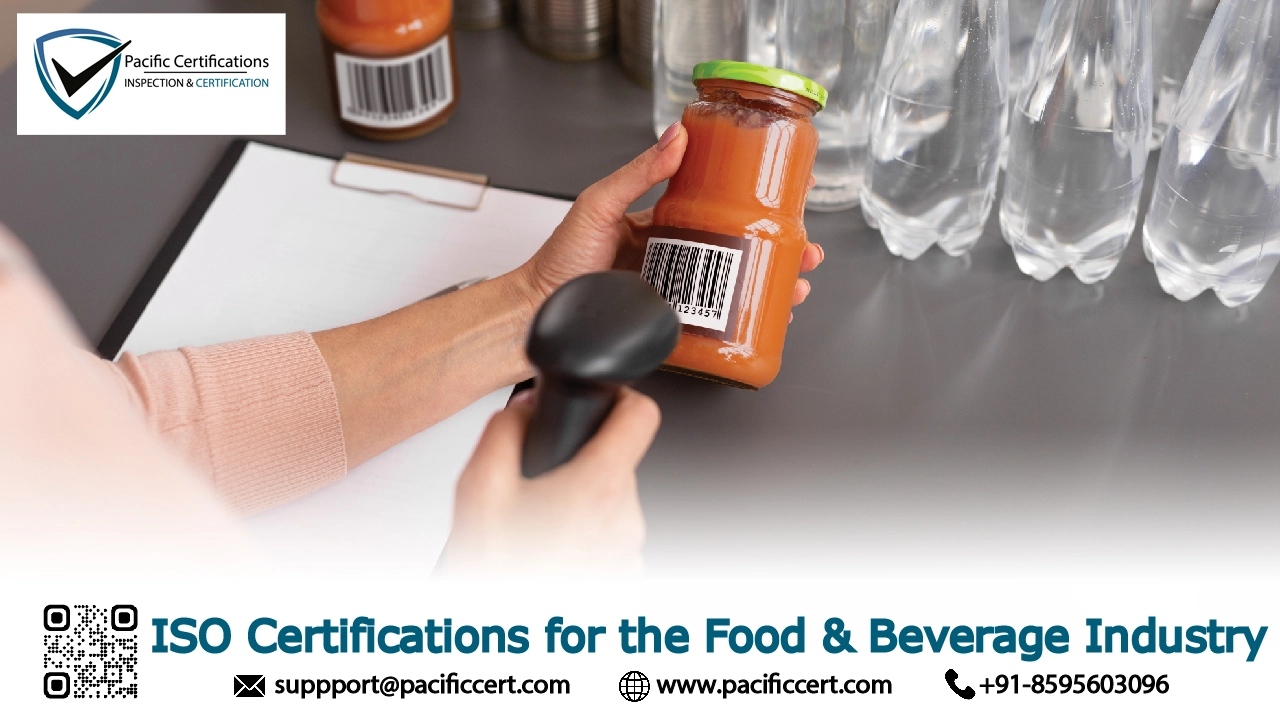ISO Certifications for the Food & Beverage Industry

The Food & Beverage industry plays a pivotal role in public health, economic stability, and global trade. From large-scale food processors to small artisanal producers, maintaining food safety, quality assurance, and regulatory compliance is essential. ISO certifications provide an internationally recognized framework that helps organizations manage these priorities while improving product consistency, traceability, and customer trust.
In a market where consumer expectations are rising and compliance regulations are becoming stricter, food businesses that implement ISO certifications are better equipped to manage risks and scale operations safely. Whether you’re in dairy processing, packaged foods, or beverage manufacturing, aligning with ISO standards demonstrates your commitment to food safety and operational excellence.
To speak to an auditor or receive a customized quote, email support@pacificcert.com
Why ISO Certifications matter for the Food & Beverage industry?
Food production involves sensitive materials, strict hygiene practices, and diverse regulatory requirements. ISO certifications provide structure and clarity, helping organizations streamline operations while upholding global food safety standards. These certifications are not just beneficial but are often necessary to meet statutory regulations and customer expectations.
Whether supplying major retail chains or exporting across borders, ISO-certified companies gain a competitive edge. Certification boosts credibility, enhances transparency, and opens doors to global partnerships. With growing concern around foodborne illnesses, traceability, and ethical sourcing, ISO standards provide a framework for proactive management.
For companies operating at scale or seeking entry into new markets, certification becomes more than just a badge—it’s a passport to trade. Many global buyers, retailers, and government agencies now require ISO-certified suppliers to ensure compliance with local and international food laws. Internally, the adoption of ISO practices encourages a culture of accountability and quality consciousness among staff at all levels. It aligns departments, improves documentation, and ensures that hygiene and safety protocols are not just theoretical, but consistently applied on the ground.
Moreover, with consumers becoming more informed and selective, transparency in sourcing and sustainability practices is under the spotlight. ISO standards help businesses communicate their commitment to food safety, ethical sourcing, and responsible production. In a market where one bad incident can break trust, ISO certification positions a company as credible, future-ready, and aligned with both regulatory and consumer expectations.
Applicable ISO standards for the Food & Beverage industry
The following ISO and food safety management standards are widely applied in the food and beverage sector:
ISO 22000:2018 – Food safety management systems
This is the most comprehensive standard for food safety. It integrates principles of HACCP (Hazard Analysis and Critical Control Points) and enables organizations to identify, monitor, and control food safety hazards across the entire supply chain.
ISO 45001 – Occupational health & safety management system
Pacific Certifications assists organizations in implementing ISO 45001 to manage workplace health and safety risks. Through audits, documentation support, and compliance guidance, we help ensure safe working environments, reduce incidents, and meet legal and stakeholder expectations globally.
ISO 9001:2015 – Quality management systems
ISO 9001 provides a quality framework applicable across all sectors, including food. It ensures consistency in product and process quality, customer satisfaction, and continual improvement.
HACCP
Hazard Analysis and Critical Control Points certification helps organizations identify and control food safety hazards across production. Pacific Certifications offers accredited HACCP certification and training to ensure compliance, reduce risks, and enhance consumer trust.
What are the requirements of ISO Certifications for the Food & Beverage industry?
Food and beverage companies face high expectations for hygiene, supply chain integrity, allergen control, and regulatory compliance. ISO standards help bring discipline to these areas by mandating policies, procedures, training, and documentation.
To implement ISO 22000 companies must:
- Perform a gap analysis to assess current food safety practices.
- Establish a food safety team and conduct hazard analysis.
- Develop prerequisite programs (PRPs) and operational procedures.
- Implement HACCP-based controls and traceability systems.
- Create food safety and quality policy documents.
- Train staff on hygiene, hazard awareness, and incident response.
- Conduct internal audits and management reviews.
- Submit documentation for third-party auditing.
- Undergo Stage 1 (documentation review) and Stage 2 (site audit).
- Address any non-conformities and take corrective actions.
- Maintain compliance through annual surveillance audits.
What are the benefits of ISO Certifications for the Food & Beverage industry?
ISO certifications offer measurable value to food producers, processors, and distributors. They help enhance product quality, reduce risks, and support operational consistency.
Key benefits include:
- Improved food safety controls reducing contamination and product recalls
- Global market access by meeting export and retailer requirements
- Operational efficiency through documented processes and responsibilities
- Customer trust and satisfaction due to reliable product quality
- Reduced non-compliance penalties by staying aligned with legal norms
- Traceability and transparency across the supply chain
- Enhanced risk management for allergens, pathogens, and packaging issues
- Audit readiness through documented systems and internal reviews
- Employee awareness of hygiene, safety, and emergency procedures
- Stronger supply chain relationships with standardized food safety practices
In an era where health-conscious consumers and regulatory bodies demand transparency, certification positions your business as reliable and responsible.
ISO Certification trends in Food & Beverage: 2020 vs. 2025
In recent years, the food sector has seen transformative changes due to evolving health policies, ESG initiatives, and digital innovations. Companies are increasingly embedding ISO principles into sourcing, production, and packaging processes.
Below is a snapshot comparing key certification trends from 2020 to 2025:
ISO Standard | 2020 Adoption Rate | 2025 Projected Rate | Key Growth Driver |
ISO 22000 | 50% | 78% | Global trade compliance and food safety mandates. |
FSSC 22000 | 35% | 65% | GFSI requirements and retail chain specifications. |
ISO 9001 | 60% | 80% | Product consistency and customer retention goals. |
The shift from reactive food safety management to proactive, data-driven compliance has significantly influenced certification demand. Digital platforms and food traceability tools are now integrated with ISO frameworks, enhancing real-time visibility and reporting.
How Pacific Certifications can help?
Pacific Certifications is an ABIS-accredited ISO certification body. We conduct impartial, third-party audits to help food and beverage companies achieve ISO 22000, FSSC 22000, and ISO 9001 certifications. Our auditors have extensive sector experience and ensure audits add value—not just documentation.
Our services include:
- ISO certification audits for food safety and quality systems
- Customized audit schedules based on production cycles and plant operations
- Pre-certification document review to ensure compliance readiness
- Integrated audits for businesses pursuing multi-standard certification
- Ongoing surveillance and recertification support
We do not provide consultancy, ensuring that our audits remain objective and in line with international accreditation rules.
For inquiries or to start the certification process, contact us at support@pacificcert.com
ISO 22000, FSSC 22000 & ISO 9001 Training and Courses
Training is essential for maintaining ISO compliance and ensuring employee engagement in food safety practices. Pacific Certifications offers training in partnership with accredited bodies:
- Internal Auditor Training: Helps QA teams and supervisors assess food safety compliance internally.
- Lead Auditor Training: Equips professionals with skills to conduct third-party audits and report findings.
- Vocational Training & Certifications: Targeted for floor-level employees to improve hygiene, cleaning, and allergen controls.
Our training supports sustainable implementation and a culture of quality and safety.
FAQ: ISO Certifications for the Food & Beverage industry
Which ISO certification is most relevant to food producers?
ISO 22000 is the core food safety standard. For global trade, FSSC 22000 is often preferred due to GFSI recognition.
Can small food businesses or startups get certified?
Absolutely. ISO standards are scalable and can be applied to businesses of all sizes, including startups and local producers.
How long does ISO certification take for a food company?
On average, it takes 2 to 4 months, depending on the complexity of your operations and documentation readiness.
Do certifications expire?
Yes. ISO certificates are typically valid for 3 years and require annual surveillance audits for continued validity.
How does Pacific Certifications support certification?
We conduct impartial audits, verify compliance, and issue certificates. We do not offer consultancy services.
Ready to get ISO certified?
Contact Pacific Certifications to begin your certification journey today!
Suggested Certifications –
Read more: Pacific Blogs



